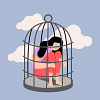Why have we normalised verbal abuse?

How do your parents talk to their employer? Their co-workers? Their office subordinates? And how do they talk to your chauffeur or house help? More likely than not, you've visualised the amount of respect in their tone and language, with their voice dropping.
We often complain about the gulf of class between people of different occupations in Bangladesh. We discuss, why in the wild west, you could do anything for money, while in Bangladesh you must factor in certain implications of class. Then we take a brief break from our discussions to demean the waiter's mother for the lack of adequate sugar in our tea.
We go back to our discussions, and no one bats an eye. After all, using language with derogatory and deeply offensive meanings is as normal in our society as eating rice for every meal.
Why are certain people considered to be and treated as less of a person than I am? What is the source of this hatred?
It could be certain historical and cultural factors, which by now, with advances in education and the economy, should have become irrelevant. Yet an imagined gulf of class has been perpetuated from generation to generation, largely through the language we use.
Parents do it in front of children. There are rarely any filters for the language and curses they use to chastise the house help. During our formative years, by absorbing the behaviour of people we trust, we internalise a lack of respect and human decency.
Language holds a dominant role in shaping society. We nonchalantly curse people, and no one flinches because we do it often. By now, through our language, it has become an established fact that my house guard is less of a human being than I am.
Due to Bangladesh's large population and lack of preferable jobs to match, there is an overabundance of people willing to do gruelling work in exchange for trivial amounts of money. When they show up for this work that already has no security or benefits, no formal contract, and is menial and grotesquely underpaid, the least we can do is not wound their humanity further with our words.
Oftentimes, they routinely face incessant verbal abuse from their employers, whether it be from accusations of not doing something according to their preferences, the employer being in a bad mood, or simply because they are habituated to talking to those they deem inferior with disrespect. Having to face this day after day with no option to quit because the only alternative is starvation and homelessness is a crippling and debilitating experience for a person.
Nowadays, there's a lot of discourse about the importance and de-stigmatisation of mental health. But why is it that only the mental well-being of certain more privileged individuals is accounted for? We respect their boundaries and don't insult things they can't control, and never cross the line to make inappropriate remarks about their family or background. And when we abuse those we deem inferior to us, it seems as if we just assume that they don't have minds.
Amrin's confusion is at its peak, she's been screaming internally for a while now. Send help at [email protected]

 For all latest news, follow The Daily Star's Google News channel.
For all latest news, follow The Daily Star's Google News channel. 








Comments